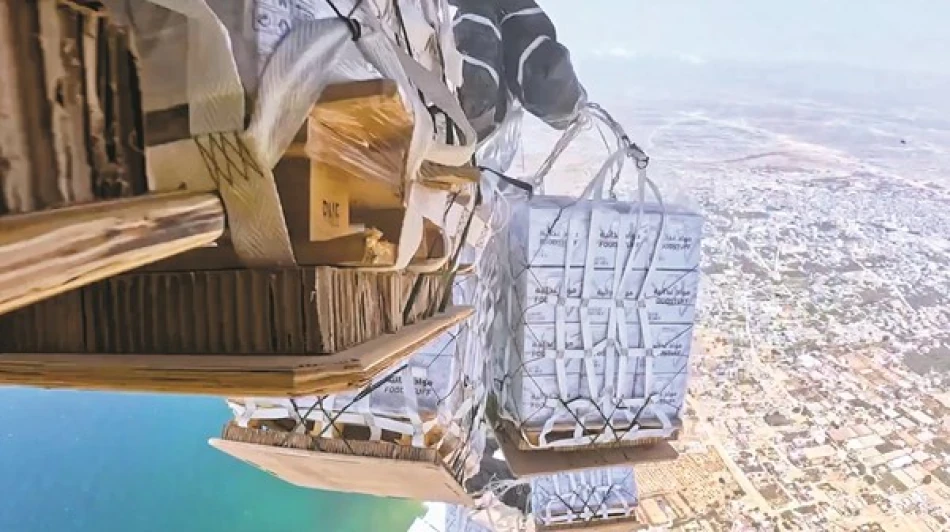
Palestinian Minister Praises UAE's Efforts in Gaza: Globally Recognized and Appreciated
UAE Emerges as Key Palestinian Ally Through Multi-Pronged Gaza Support Strategy
The United Arab Emirates has positioned itself as a crucial lifeline for Palestinians in Gaza, delivering comprehensive humanitarian aid while simultaneously advancing diplomatic efforts for a two-state solution. Palestinian Local Government Minister Dr. Sami Hajjawi's recent praise for UAE initiatives highlights how Gulf states are reshaping Middle Eastern diplomacy through practical humanitarian action combined with political advocacy.
Beyond Aid Drops: UAE's Comprehensive Gaza Relief Operation
The UAE's approach to Gaza relief extends far beyond traditional aid distribution. According to Minister Hajjawi, Emirati efforts include airdrops of essential supplies, field hospitals, water desalination plants, and continuous humanitarian convoys. This multi-faceted strategy addresses Gaza's most pressing infrastructure needs while circumventing blockade restrictions that have limited other international relief efforts.
The scale and consistency of UAE aid has drawn regional and international recognition, particularly as Gaza faces what Palestinian officials describe as systematic starvation policies. The Emirates' ability to maintain aid flows demonstrates sophisticated logistics capabilities that rival those of established international relief organizations.
Diplomatic Positioning: Two-State Solution Advocacy
Strategic Conference Participation
The UAE's participation in the Two-State Solution Conference held in New York in late July 2024 signals a broader diplomatic strategy. Rather than limiting involvement to humanitarian assistance, the Emirates is actively engaging in committees and initiatives that emerged from the conference, positioning itself as a key stakeholder in future Palestinian statehood discussions.
This dual approach—combining immediate humanitarian relief with long-term political solutions—mirrors successful Gulf diplomatic strategies seen in other regional conflicts, where economic leverage and humanitarian credibility create political influence.
Regional Implications for Middle East Diplomacy
Gulf States as Power Brokers
The UAE's Palestinian engagement reflects a broader trend of Gulf states assuming greater diplomatic leadership in regional crises. Unlike traditional approaches that separated humanitarian aid from political positioning, the Emirates is demonstrating how economic resources can be leveraged for diplomatic influence while maintaining relationships across political divides.
This strategy contrasts with historical patterns where Gulf states provided financial support with limited political engagement. The UAE's active participation in international forums alongside humanitarian operations suggests a more assertive regional foreign policy approach.
Market and Economic Considerations
The UAE's sustained Gaza engagement carries significant economic implications beyond immediate aid costs. By establishing infrastructure like desalination plants and medical facilities, the Emirates is creating potential foundations for post-conflict reconstruction contracts and long-term economic partnerships.
For international investors and regional markets, the UAE's consistent humanitarian presence in Gaza signals political stability and strategic thinking that could influence future Middle East economic development projects. The approach also demonstrates how Gulf capital can be deployed for diplomatic influence without requiring military intervention.
Challenges and Reconstruction Prospects
Minister Hajjawi's call for intensified international pressure to end the conflict and begin reconstruction efforts highlights the practical limitations of humanitarian aid without political resolution. The UAE's comprehensive approach positions it advantageously for potential reconstruction leadership, having established operational networks and diplomatic relationships essential for post-conflict development.
The success of the UAE's current strategy could establish a template for Gulf state engagement in regional conflicts—combining immediate humanitarian response with long-term political and economic positioning that serves both altruistic and strategic national interests.
Most Viewed News

 Layla Al Mansoori
Layla Al Mansoori






